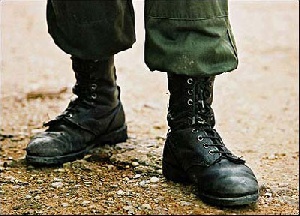About six months ago, an article was posted on the desperate, underhand and probably unlawful measures being used by the Ghana Armed Forces (GAF) to stem the tide of departing officers. The subject continues to intrigue me because what started as a trickle is fast becoming a flood. Reliable information has it that the President (also the Commander in Chief) is showing interest: a Presidential Commission is almost underway.
Apparently the unceremonious resignation of three senior officers in the past 6 months has compelled the military authorities to start looking at the problem in more than a cursory fashion. The exhortations of loyalty, service to the motherland and dying for one’s country seem to have lost their charm for our men in uniform. The phenomena of AWOL (Absent without Official Leave) and desertion which were previously largely confined to officers who thought their career prospects were not that bright seems to have infected even those who were being groomed for higher rank in the Forces. Since quality manpower is the military’s - any military’s - most valuable resource, there are serious implications for national security if best are leaving.
The last straw that woke the commander-in-chief up was the unceremonious departure of Colonel Brakatu, a former director of Army Intelligence. The forces woke up to find his resignation letter and his empty military accommodation. Lt Col Akyeampong, a graduate of the prestigious British Royal Military Academy, Sandhurst, commander of the Signal Regiment and an officer of no mean repute did not even wait for his tour of duty in the UN peacekeeping operation in Liberia to end. He submitted his resignation letter from Liberia and departed without returning to Ghana. Our information is that as soon the armed forces announced a regulation making it compulsory for officers to give two years notice of their intended retirement, he decided not to stick around any longer. The conditions of service as he understood them had changed substantially and he was not prepared to servie under the under conditions. Before him, Lt Col Frempong, also a Sandhurst graduate, former commander of the prestigious Jungle Warfare School and regarded by most officers as another high flyer, tried for several months to secure his proper release from the Service. He did everything by the book, but the authorities refused to act on his application to the point where his prospective employment was seriously threatened. In desperation, he resigned his commission, forfeited the benefits of more than 20 years of distinguished service and left. For his reward, he was declared a deserter.
These were the last 3 in a long series of desperate separations from the Ghana Armed Forces. The list includes Commander Appiah-Mensah, Major Jato, Maj Woanya, Maj Azumah and Major Otinkorang. All the officers had served the minimum period required by regulation to seek retirement; all were compelled to forfeit their retirement benefits. Maj Jato lost his prospective employment because his application took more than a year to process and he was unemployed for almost three years. Imagine the repercussions for his family. These are representative of the buga-buga personnel policies. The shabby treatment of these officers has caused great consternation among the rank and file of the Ghana Armed Forces. There is a long line of officers waiting to serve their time and go home because they are frustrated by the working conditions in the army. The barracks are in shambles, most of the accommodation (though nicely painted) is dilapidated. Most are death traps. The sewage system in Burma Camp and other barracks in the country are literally epidemics waiting to happen. But the soldiers stoically accept this. They are made of sterner stuff. Those who can afford it move out of barracks. A big part of their frustration comes from the shortage of practically everything they require to do their jobs; you name it, its in short supply. From boot laces (let alone boots) to weapons, vehicles, equipment, stationery, training everything! The frustrations of not being able to do their jobs is telling on the rank on the file, mot of whom find themselves ‘doing magic’ (a military term for excessive improvisation) for unduly long periods to find the resources to carry very simple tasks (like collecting training rations from the Burma Camp Supply Depot.
Of course it is difficult for most civilians to appreciate these difficulties because Ghana is not at war. But an Armed Forces is like the inflated inner tubes that are placed at the beach. You hope you won’t have to use them, but you are happy to know they are there if you need them. It is naïve for anyone to think that just because a country is not at war, there is no need to have credible defence forces. That is the deterrent against all sorts of detractors local and foreign who seek to destabilise the nation. Ask President JAK the secrets of the second round of the 2000 elections and handover from Rawlings and he will tell you how silently, the Ghana Armed Forces protected our yet-to-born democracy from the machinations of you-know-who.
But talking to most officers, one gets the impression that the anger is not directed at the Government per se. It is directed at their own commanders. Certainly one does not get a feeling of any desire on the part of the soldiers to resort to the measures of the hooligans of 1979 and 1981 to disrupt the country. Most are happy to be part of the freedoms that are afforded by democracy and the rule of law which are making bold strides in our country and the subjugation of the military to civilian authority that it requires. Many preach it.
But the feeling is that the tenets of the rule of law have not permeated the Ghana Armed Forces. The military has its own laws and regulations, but even these are applied unevenly, in an arbitrary fashion and interpreted according to the whims of individual commanders. The regulations on retirement from the Armed Forces are clearly spelt out and even though the CDS and other subordinate commanders have discretion, they should exercise this wisely. There is simply no merit in retaining an officer who has served his time and wants to leave, especially in a peacetime army. You only end up with an underachieving soldier who is a danger to himself and if he is an officer, a danger to the lives of the men he leads. Some officers who have been at the receiving end of this poor treatment have resorted to the law courts to seek justice. None have lost so far.
That said, the real problem is that in an undermanned army, too many officers are trying to leave. The commanders have responded by treating the symptoms, forcing them to stay. The real disease is job satisfaction, or rather the lack of it, the ‘Ashantism’ or ‘Akanism’ that has crept in with Wofa JAK, his MOD brother and their loyal servant the CDS. And I’m not talking poor emoluments (a chronic affliction of any one who works for the government). The other problem lies in the personal planning and manpower policies of the armed forces. Most of the policies have not been reviewed since nineteen-kwadwo- ho-ho (as my grandmother used to say). It is increasingly obvious that present generation of officers and men are aware and want to be part of the global mobility of professional expertise. Not everybody wants to spend the whole of their working lives in uniform especially in a profession as physically challenging and as stressful as the military where confronting death can be a daily occurrence. If national security considerations are considered important, then armed forces recruitment and conditions should be geared towards motivating those who sign up to stay. In any case, any future policy will to take account of the tendency of soldiers to serve for shorter periods. Renewable five-year contracts for officers might be just what the doctor ordered.
I’m personally looking forward to the establishment of the presidential commission and what its terms of reference will be. There should be some interesting revelations, reparations and policy revisions. Maybe a review of the whole configuration of how our armed forces is manned, equipped and administered might result. Kudos to that!













